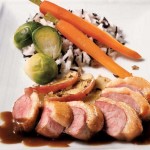Duck Breasts, Demi-Glace Sauce and Apples
Print Category Duck Thematic Autumn Winter Stove Source IGA Evaluation
☆
☆
☆
☆
☆
Recipe pictures
You’re cooking one of our recipes? Share the pictures of your culinary masterpiece on our website for a chance to win an awesome apron from Recipes Quebecoises. There will be a draw every month.
 Click to enlarge
Click to enlarge Ingredients
- 4 duck breast halves (about 225 g / 8 oz each)
- Black pepper to taste
- 2 French shallots, finely chopped
- 2 mL (1/2 teaspoon) crushed fennel seeds
- 2 red apples, cored and sliced
- 1 envelope commercial demi-glace sauce
- 250 mL (1 cup) water
- 80 mL (1/3 cup) apple juice
- 15 mL (1 tablespoon) honey
- Salt and pepper to taste
Preparation
- Preheat oven to 150?C (300?F). Using a sharp knife, score duck skin in a diamond pattern. Season both sides of breast halves with pepper. Cook breast halves, skin-side down, in an oven-proof skillet for 4 minutes over medium-high heat. Turn over breasts and cook for 2 minutes.
- Finish cooking in the oven for about 10 minutes, or until internal temperature has reached 63?C (145?F) and meat is rosy. Remove duck from skillet and cover with aluminium foil. Allow to sit at room temperature for 10 minutes. Drain all but 15 mL (1 tablespoon) fat from skillet.
- Heat remaining duck fat over medium heat, and sauté shallots and crushed fennel seeds for about 1 minute, or until shallot is soft. Add apples, salt and pepper. Sauté for 1 more minute or until apples are hot but still crisp. Keep warm. In a saucepan, mix demi-glace sauce, water, apple juice and honey. Bring to a boil and reduce heat to low. Allow sauce to reduce for about 10 minutes.
- Slice duck breast halves and serve with cooked apples and demi-glace sauce. Accompany with a mix of white and wild rice and vegetables
Cook commentary
Serves: 4
VARIATION: Replace apple juice with orange juice and garnish duck with fresh orange slices. Omit cooked apples. Make the pleasure last! To enjoy the delicious taste of duck more than once, you need only save the fat melted during cooking. Since this fat tolerates heat well better than butter it can be used to preserve, fry, grill or sauté other food. And although duck fat is not as high in beneficial monosaturated fats as canola and olive oils, it does contain less saturated fat than butter a good excuse to enjoy this delectable treat from time to time





No comment